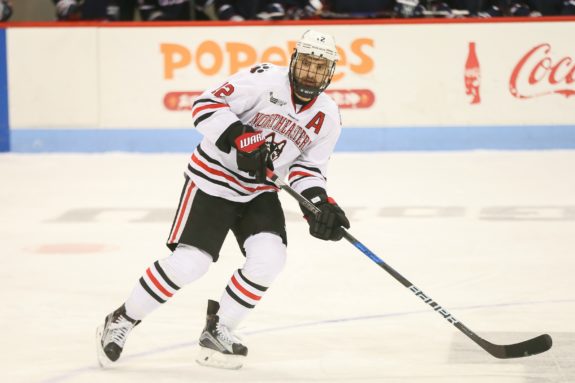On July 12, forward Josh Archibald signed with the Penguins for a two-year contract at just over the league minimum. The contract isn’t inherently a bad idea. Archibald has shown promise with the Penguins, laying his fair share of determined hits whenever he gets ice time. His puck-handling skills put him on a level with other up-and-coming Penguins wingers like Tom Kuhnhackl and Scott Wilson. The problem with this contract, however, is that it is one-way.
A one-way contract doesn’t mean that Archibald can’t be sent back down to the minors, but it means that he receives the same salary wherever he’s playing. That serves as motivation for the Penguins to keep him up in the NHL. Archibald, who has been with the Wilkes-Barre/Scranton Penguins for four seasons but has only been called up to the major league for 11 regular season games, is still somewhat of an unknown quantity. And he could be a barrier to players like Zack Aston-Reese and Daniel Sprong getting to make their NHL debuts.
A Glut of Penguins Forwards
With the signing of Archibald, the Penguins now have 11 forwards officially on one-way NHL contracts. In addition, there’s also Jake Guentzel (entry-level contract) and Conor Sheary (still a restricted free agent). Given that Sheary signs, those two players are all but guaranteed to start the season in the NHL. That means that the Penguins will have 13 forwards vying to fit into a maximum of 12 spots on the roster.

So what does that mean? It might mean that a trade is in the works—after all, only three of these forwards are centers. Sidney Crosby and Evgeni Malkin are centering the top two lines, and Carter Rowney will presumably take up possibly-retired Matt Cullen’s mantle and center the fourth line. That means the Penguins are still in the market for a third-line center. Maybe some of these players are part of a future deal to acquire a replacement for Nick Bonino.
But what else it means is that this glut of offensive talent might block players on entry-level contracts, such as Zach Aston-Reese and Daniel Sprong, from getting the chance to prove themselves in the NHL.
Promising Penguins Prospects
Zach Aston-Reese was one of the most sought-after college players in the 2016-17 season after he followed a 43-point, 40-game season with an incredible 63-point, 38-game season. Daniel Sprong scored 59 points in 31 games in the QMJHL this past season. Both have been offensive powerhouses on their respective stages. The question is whether or not they will be able to cut it at the same elite level in the NHL.

The answer to this question depends on the two forwards seeing actual NHL time. That might be able to happen this season if it weren’t for the fact that there are so many forwards already playing at the NHL level who demand roster time because of their fixed cap hits.
Sprong and Aston-Reese won’t begin the season in the NHL, but it will be interesting to see how they fit onto the roster mid-season. As general manager Jim Rutherford said, Aston-Reese will “probably be in Pittsburgh sooner than later.” The likelihood that we will see that happen in the 2017-18 season depends on a few things. Sprong and Aston-Reese finding success in the minor leagues is one. And the Penguins having empty spaces on their roster is another.

A Crowded Roster
Players like Kuhnhackl, Wilson, and Archibald have at times found themselves as healthy scratches because the Penguins are prioritizing other offensive talents. Their one-way contracts make them a priority in terms of getting major-league playing time, but they could also be the barrier preventing new talents like Aston-Reese and Sprong from feeling their way into the NHL. Archibald’s cheap contract is a smart signing. Nevertheless, it could become a problem as offensive talent stacks up in Wilkes-Barre/Scranton. Signing Archibald on a two-way contract just for roster flexibility most likely would have been preferable for the Penguins.